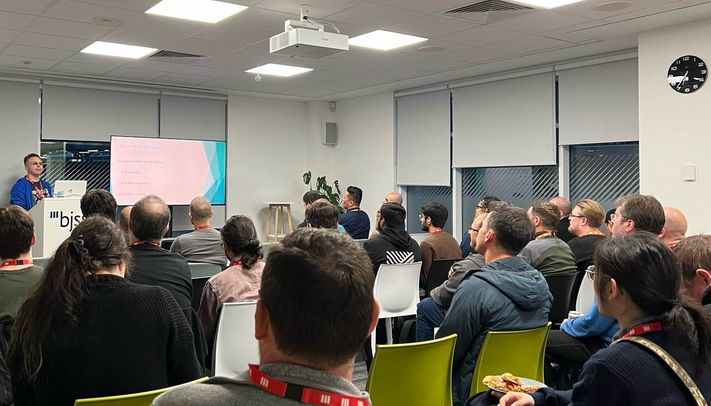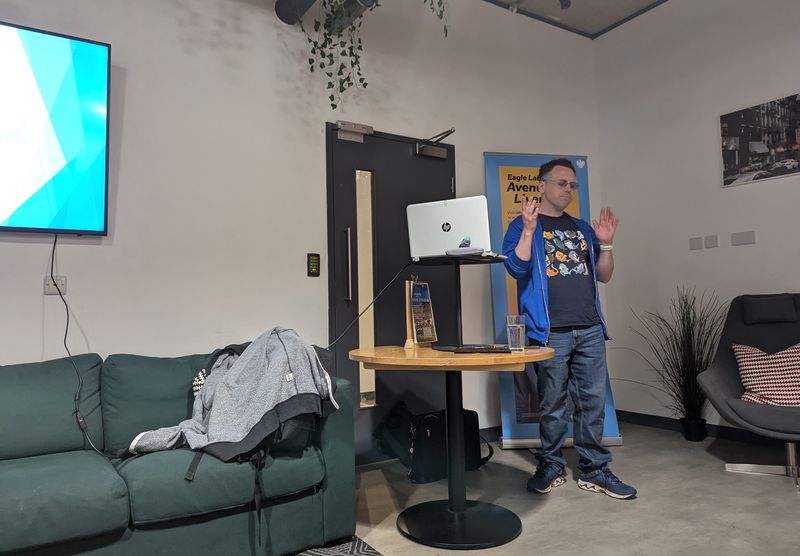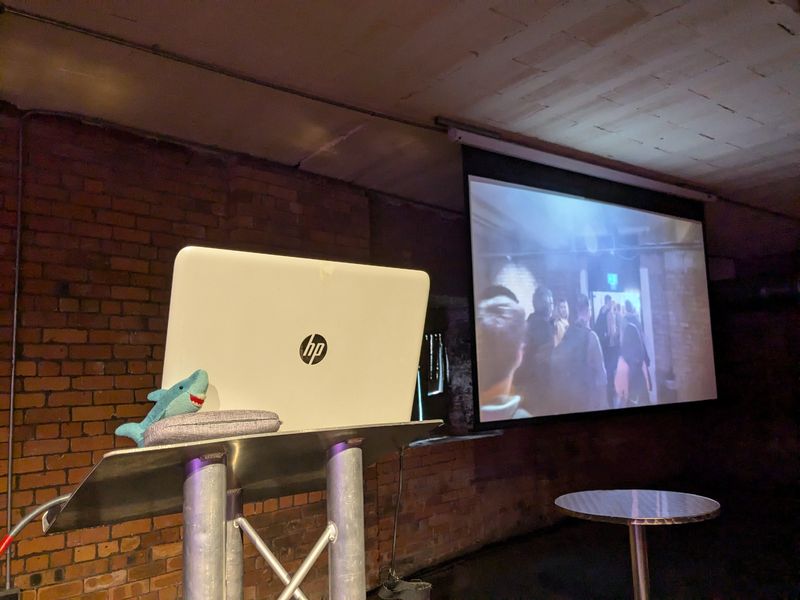In this post, I share three mantras for the anxious new speaker and some helpful resources for session development that I’ve used this year.
Table of Contents
Introduction
This year has been a whirlwind! After presenting my first in-person session at AWS Community Summit London in April, I’ve since spoken at user groups, a paid event and even internationally!
This hasn’t come easy for someone as naturally anxious as me. I work procedurally in many areas, which doesn’t lend itself fully to organic and spontaneous pursuits like public speaking.
I use mantras during exercise when I need quick guidance that’s easy to recall, and after London I realised that a similar approach while speaking would calm my nerves and refocus my attention. These mantras have since become invaluable, so now I’ll present them here.
Firstly, I’ll share three mantras that have guided me through developing, presenting, and evaluating my sessions. Following this, I’ll add some helpful resources for session creation, slide deck development and delivery mindset.
Mantras
This section contains three mantras for the anxious new speaker that I’ve used this year.
No One Wants You To Fail
I begin with some imposter syndrome goodness. Public speaking offers rich ammunition for imposter syndrome sufferers, like:
- “The audience will be full of experts and I don’t belong in front of them.”
- “No one will enjoy my session or find it useful.”
- “No one will take me seriously.”
But the reality is very different. Audiences want speakers to succeed because it creates a more enjoyable and informative event, fostering better knowledge sharing and a positive atmosphere.
And it’s not like the session’s content is a secret! Consider delivering a session to a user group. The session’s abstract has likely been seen by a user group leader and several audience members before the doors even open. People know what they are getting into and are choosing to be there!
Audiences want to enjoy and benefit from the session, and they’re often patient, understanding, and forgiving when things don’t go perfectly. They’re not there to criticise or judge – they’re hoping the speaker succeeds and provides value.

People Are Watching The Slides, Not You
Flashback to April 2024 – my first in-person session at AWS Summit London. I was presenting midway through the day, and my anxiety brain entered high gear while waiting:
- How should I stand?
- What should I do with my hands?
- How often should I look at the audience?
- OMGOMGOMG
Anxiety brain then fixated on the various keynotes and TED Talks I’ve seen instead of focusing on my session. Great.
Then I had an idea. I started watching the audience. Some people were checking their lanyards and swag bags. Others were glancing at the passing crowds or grabbing a coffee from the nearby Serverlesspresso stand. But most were fully focused on the slides.
No one was fixated on the speaker.
Next, I watched the speaker. They looked up and down, occasionally gesturing. Nothing about their delivery felt like a finely choreographed routine.
In those moments, I realised that I was holding myself to impossibly high standards for my first in-person session. This wasn’t reality TV or theatre. This was a group of enthusiasts with common interests seeking knowledge. The audience wasn’t here to watch me. They were here to watch the slides.
That shift in perspective helped me so much. Without that mantra in April, there’s no way I would have been capable of doing Comsum (a filmed session in front of a paying audience) in September:
Every Minute Is A Victory
I said I use mantras during exercise earlier, and this one is pretty much a straight rip from those. Being a speaker (especially an anxious new speaker!) demands time and energy for tasks like:
- Developing an abstract, submitting it to a user group or call for papers and awaiting the outcome.
- Curating and preparing a session, updating and refining a slide deck and practising delivery.
- Making sure you’re in the right place, at the right time with the right materials. And waiting for the day to arrive!
- Delivering the session, maintaining flow and addressing audience questions.
- Evaluating the session, tweaking the content and reflecting personally on the experience.
It would be easy to look at all this, nope out and spend your time elsewhere. So every minute spent on a session, from inception to post-delivery, is a victory.

Resources
This section contains some helpful resources for session development.
New Stars Of Data Library
New Stars of Data is an event dedicated to mentoring and promoting new speakers in the Microsoft community. It is run by Ben Weissman and William Durkin, and is supported by a team of experienced speakers. I participated in NSOD6 in 2023.
New Stars Of Data has a Speaker Improvement Library supported by the Microsoft Azure Data Community. This library was invaluable during my New Stars of Data journey, and I still refer to it regularly for guidance and inspiration.
Here are some of my personal favourites from the library:
Cult Of Done
Next, let’s discuss Bre Pettis and Kio Stark’s Cult of Done Manifesto. I have previously written about the Cult Of Done, and actively use it for creative and professional tasks. The following CoD principles relate well to the anxious new speaker:
“Accept that everything is a draft. It helps to get it done.”
Cult of Done Manifesto Principle 2
In my experience, a session is never truly finished. Slide optimisations and delivery improvements often become evident during the presentation. Audience questions and comments may prompt revisions. And as technology and the cloud evolve, the session itself may need to change.
Currently, I’ve presented Building And Automating Serverless Auto-Scaling Data Pipelines In AWS five times this year. No two sessions have ever been the same. Each time has essentially been a draft!
“Pretending you know what you’re doing is almost the same as knowing what you are doing, so just accept that you know what you’re doing even if you don’t and do it.”
Cult of Done Manifesto Principle 4
This is already pretty descriptive – an eloquent version of “fake it till you make it”. To paraphrase Tris Oaten, you’re watching me learn how to construct a session in real-time. You’re watching me learn to present in real-time, and how to submit abstracts, build confidence and answer audience questions in real-time.
This is a continual journey that even seasoned presenters are on. There is no shame in such a journey, so embrace it.
“Done is the engine of more.”
Cult of Done Manifesto Principle 13
Every finished session offers something in exchange. This ranges from improved confidence and skills to increased momentum and drive. And the more abstracts written, the more sessions submitted and the more presentations delivered, the more you build a foundation for better talks, deeper insights, and greater confidence in your abilities.
Note that ‘more’ doesn’t necessarily mean ‘more sessions’ here. ‘More’ can mean:
- Personal growth
- Networking with fellow enthusiasts and community members.
- Development opportunities (you never know who’s in the audience!)
I’ll end it here, but many other principles apply. Be sure to check out the full manifesto and Tris’ No Boilerplate video for more insights:
Summary
In this post, I shared three mantras for the anxious new speaker and some helpful resources for session development that I’ve used this year.
Public speaking comes more easily to some than others. I never expected to find myself in this position, and I’m not sure I would have believed anyone who told me this is how 2024 would unfold! Mantras are powerful tools for calming nerves and building confidence, and if these don’t resonate with you then there are plenty of others to explore.
If this post has been useful, check out the button below for links to my contact information, social media, projects, and upcoming sessions:
Thanks for reading ~~^~~

